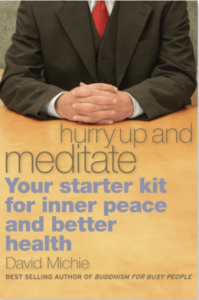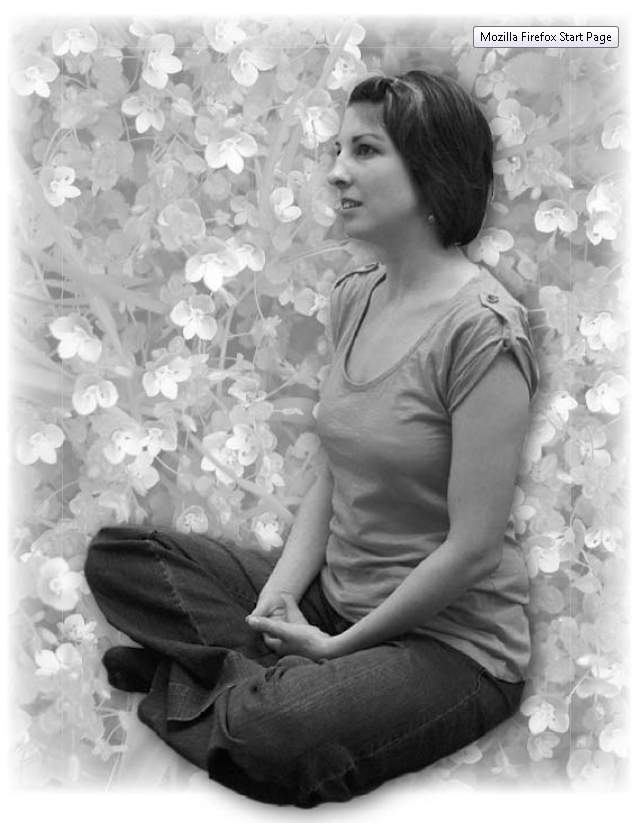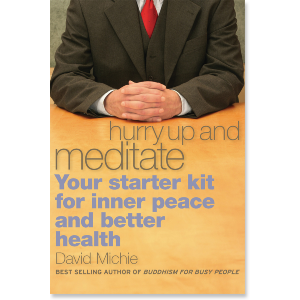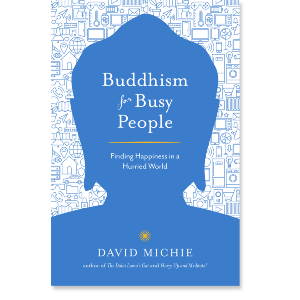Science shows that meditation is one of the best relaxants available
Best-selling author David Michie takes a look at some of the psychological and physical benefits of meditation in these excerpts from his book, Hurry Up and Meditate.
The most obvious physical change that occurs when we bring body and mind together in meditation is that breathing naturally slows and, with it, the heartbeat. Blood pressure decreases and so too the metabolic rate. Muscular tension reduces significantly.
In short, we relax.
It’s important to note that these physiological changes do not arise merely by resting. Repeated research shows that we can’t get the same benefits simply by sitting down and daydreaming or enjoying a cup of tea. In a state of ordinary physical rest, when we make no effort to manage our mental focus, we do not see a lowered rate of metabolism, a decrease in the use of oxygen, or reduced output of carbon dioxide. Nor do we see the heart rate decrease, as it does in meditation, by several beats a minute—in some cases, by as many as fifteen.
When we meditate the lactate concentration in our blood also decreases by up to a third. Why should this matter? Because blood lactate level is associated with tension and high blood pressure, and the infusion of lactate in the blood produces symptoms of anxiety. Studies have shown a reduction in lactate concentration in meditators of about four times as much as people who are merely resting. A quite separate biological marker of stress—resistance of skin to a mild electric current—has similarly been shown to decline by about four times among meditators.
A different significant effect of meditation is its impact on the hormones released by our bodies. Chocolate, sex, morphine, and acupuncture all stimulate the production of endorphins by our bodies. Joggers and gym junkies are familiar with the postworkout high—nature’s way of saying, “keep doing that.” So too, meditation increases endorphin output, and the resulting feel-good emotions are only part of the systemic benefits endorphins deliver. In short, meditation not only helps us get rid of unwanted symptoms of stress, it also creates positive body–mind states.
For more than thirty-five years, Dr. Herbert Benson, President of the Mind/Body Medical Institute and Associate Professor of Medicine at Harvard Medical School, has been studying what he calls “the relaxation response,” the state elicited by meditation. And as his research has importantly shown, the relaxation response has impacts which go well beyond any specific meditation session. What’s more, practicing meditation over a period of time has significant cumulative benefits.
Just as regular gym-goers experience the benefits of their exertions even when they are no longer at the gym—being able, for example, to hurry up a flight of stairs without getting breathless, or effortlessly to carry heavy luggage or grocery bags—so too meditators experience the benefits of their practice when off the meditation cushion. Apart from feeling calmer and better able to deal with the psychological stairs and interpersonal heavy luggage in everyday life, meditators experience benefits that can be measured physiologically. To quote Benson: “Repeated activation of the relaxation response can reverse sustained problems in the body and mend the internal wear and tear brought on by stress.”
Like a lot of people, the reason I started to meditate was in an effort to counteract stress. In my early thirties I had a demanding job in one of London’s most successful corporate public relations agencies. Having been brought up under the vast blue skies and in the wide open spaces of Africa, it was a tough adjustment for me to live in a shoebox-sized flat, deal with crowded commutes into central London, manage the stresses and long hours demanded of an up-and-coming spin doctor, and then try to find time for a social life. From a career point of view I knew I was in the right place. But I felt stressed out. So much so that I actually began breaking out in rashes.
At first I had no idea what was causing the itchy pink dots which would appear on my wrists and ankles for no apparent reason at random intervals during the day. The public health sector doctor to whom I eventually turned told me I was suffering from an allergic reaction, prescribed an antihistamine, and sent me on my way.
It was a naturopath whose flyer hit my doormat at just the right moment who fully explained my situation. Apprehensive about carrying a bottle of antihistamines around in my pocket for an indeterminate period, I made an appointment with this no-nonsense lady, who peered long and hard into my irises, made disapproving clucking sounds, and started asking about my daily routine. Among her questions was: How many cups of coffee did I drink? To which the answer was: Eight.
It turns out that a caffeine intolerance was the cause of the rashes—after I replaced coffee with water for a while, they disappeared completely. But quite apart from that, the naturopath told me that my whole system was stressed. I needed to do something to restore a sense of balance. She suggested meditation.
I’ll never forget the intense self-consciousness I felt those first few weeks when I got out of bed ten minutes earlier than usual to meditate. What I was doing felt contrived and artificial. Who the hell did I think I was sitting cross-legged like Maharishi Yogi, supposedly focusing on my breathing, but in reality distracted by every early-morning jet coming down into Heathrow, the sounds of the trash collectors and street sweepers, the angry hooting of horns as early-morning commuters got off to a bad start?
Despite my extremely poor concentration, however, I persisted. Not only because I knew it was supposed to do me good, but also because those ten minutes of being awake and alert were among the precious few when I felt no demands were being put on me. I’d given myself permission not to think about all the usual preoccupations—I had the other twenty-three hours and fifty minutes to do that. This was my ten minutes of “time off.”
And within even a few weeks I sensed a strange thing happening. At odd moments during the day I would remember that I’d meditated that morning, and in that moment of recollection I’d feel some of the same relaxation and letting go that I had in the morning. What Dr. Benson describes as “the relaxation response” felt, on a subjective basis, a bit like letting the steam out of a pressure cooker. Yes, I still got stressed out, pissed off, and agitated, but for the first time I had resources with which to deal with it. Interestingly, I was also becoming more aware of my moods as they were happening to me, rather than after the event. Without consciously setting out to, even those few minutes of very low-grade meditation were helping me become more aware of how I was feeling and acting during the day, and more conscious that I did have some choice in the matter.
Meditation should come with a health warning: Beware, this practice is addictive! Because even though I was often a reluctant meditator, and despite the struggle I experienced trying to sustain concentration for more than a few moments, the simple fact was that I liked what meditating was doing for me. Yes, it was definitely helping me with my stress. But that was only the beginning.





